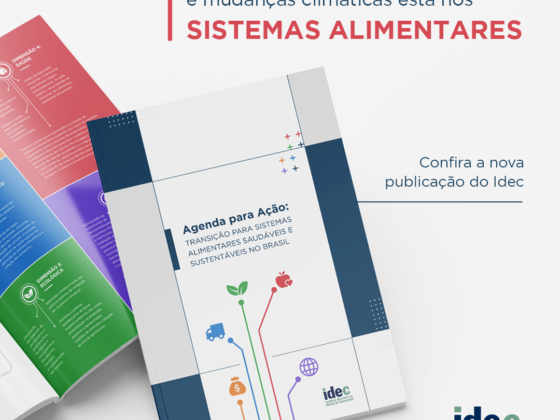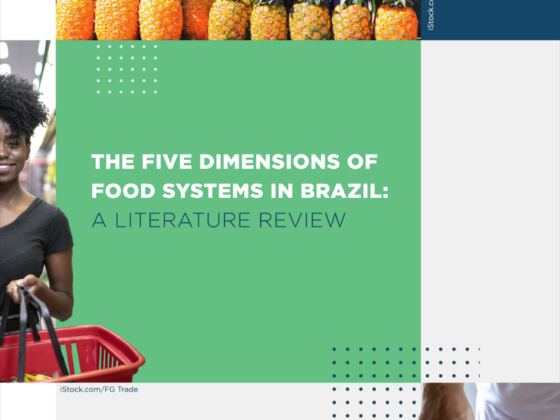Idec launches study analyzing more than 100 publications on food systems
Literature review highlights connection between hunger, obesity and climate change in order to provide scientific references to promote a transition of models

The Brazilian Institute for Consumer Protection (Idec) launched today (2) “The Five Dimensions of Food Systems in Brazil: a literature review”. The publication analyzes 113 scientific studies that address the current logic of food production and consumption to map how governance, business and supply and demand models operate, in addition to their implications for ecology and public health.
The literature review draws on these five dimensions of food systems to forcefully address the relationship of obesity and malnutrition pandemics to climate change – and how corporate food systems are a central cause of these global crises.
“Our objective is to provide public managers with a rich source of scientific foundations for the creation of an integrated agenda that promotes healthier and more sustainable food systems in Brazil”, explains Janine Coutinho, coordinator of the Healthy and Sustainable Food Program at Idec.
The five dimensions of food systems in Brazil
The publication presents an executive summary, methodology and theoretical-conceptual framework, in addition to the results of the analyses, structured in five dimensions: business, supply and demand, ecology, health and governance.
According to Potira Preiss, researcher and author of the study, each dimension has a thematic scope, the context of the challenges to be overcome and the literature recommendations. “Despite food systems being a recent topic in the international literature, the study shows that there is a robust Brazilian scientific production on the subject, which should be valued and better used in the formation of public policies”, she points out.
Also presented are 100 political and legal frameworks in force in the country that contribute to the transition to a healthy and sustainable food system, according to the literature analyzed.
Business
Although Brazil figures as one of the leaders in food production, the agricultural logic and encouraged by public policies is oriented towards the production of commodities aimed at commercialization in the international market through long supply chains.
It is necessary to pay greater attention to the social needs of the domestic food market, with measures to end monopolies in the food market and promote family farming, encouraging productive diversification and the role of the state as market regulator.
Supply and demand
The highly unequal distribution of food in Brazil is a structural problem in food systems. The study points out that only a small rich portion of the population has access to healthy food, while many people do not have the resources to eat properly.
Constant actions are needed to guarantee food security for the most vulnerable populations, in particular female heads of households, in addition to valuing short chains with localized supply dynamics made by family farming.
Ecology
The Brazilian food system is based on large-scale food production, based on monoculture and extensive cattle raising, with intensive use of pesticides and chemical additives. This logic is directly linked to deforestation, change in land use, pollution of natural resources and gas emissions contributing to climate change. Since 1990, it is estimated that approximately 80% of gross GHG emissions in the country are linked to agriculture.
Among the recommendations, we highlight productive diversification, encouragement of agroecology, low-impact livestock production, measures to control and reduce the use of pesticides, expansion of environmental protection areas, compliance with the National Policy on Climate Change (PNMC) and targets agreed in the Paris Agreement.
Health
The production and consumption models of food are making the population sick. The intensive use of pesticides and the low diversity of food in crops, combined with the offer of ultra-processed products that are cheaper than fruits and vegetables, contribute to malnutrition and at the same time to the increase in people’s obesity, creating the phenomenon of the duo malnutrition.
It is necessary to guarantee the Human Right to Adequate Food and the qualification of food environments, providing qualified food in schools, shelters, hospitals, among other institutional spaces, and avoiding supply problems. To restrict the consumption of ultra-processed foods, it is necessary to promote actions to control this production, adequate labeling and the creation of taxing mechanisms. The study also suggests carrying out campaigns to publicize the Food Guide for the Brazilian Population.
Governance
Although the literature review allows us to affirm that Brazil has a legal framework aligned with Food and Nutritional Security and the Human Right to Adequate Food, publications that analyze the contemporary scenario warn of a serious setback in food security policies. A clear example was the extinction of Consea, the National Council for Food and Nutritional Security.
The recommendations propose to structure decentralization mechanisms focused on facilitating the capillarity of food security. Own financing can help states and municipalities prioritize the transition to agroecological food systems that integrate rural and urban dynamics. It is also recommended to expand research that can assess the inuence of companies in the food sector in the process of public decision-making in the country, including considering the process of financing electoral campaigns.
Access the publication “The Five Dimensions of Food Systems in Brazil: a literature review” here.
Read more about Food Systems on the Feeding Policies website, an initiative from Idec.
This literature review is part of the project “An Agenda for Action – Transition to a Healthy and Sustainable Food System in Latin America”, promoted in Brazil by Idec with the objective of supporting the creation of an action agenda for the transition of food systems in the Brazil and Latin America. The project is underway in Latin America, having as Argentine partners the Centro de Estudios de Estado y Sociedad (CEDES) and the Universidad Adolfo Ibáñez (UAI) in Chile. Financial resources are provided by the International Development Research Center (IDRC) and the Wellcome Trust.
More info:
Alan Azevedo | +55 11 99650-1475
Raquel Paris | +55 88 98822-9562



